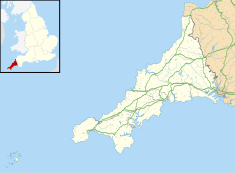
Marazion is a civil parish and town, on the shore of Mount's Bay in Cornwall, England, United Kingdom. It is 2 miles (3.2 km) east of Penzance and the tidal island of St Michael's Mount is half-a-mile offshore. At low water a causeway links it to the town and at high water passenger boats carry visitors between Marazion and St Michael's Mount. Marazion is a tourist resort with an active community of artists who produce and sell paintings and pottery in the town's art galleries.

Penzance is a town, civil parish and port in the Penwith district of Cornwall, England, United Kingdom. It is the westernmost major town in Cornwall and is about 64 miles (103 km) west-southwest of Plymouth and 255 miles (410 km) west-southwest of London. Situated in the shelter of Mount's Bay, the town faces south-east onto the English Channel, is bordered to the west by the fishing port of Newlyn, to the north by the civil parish of Madron and to the east by the civil parish of Ludgvan. The civil parish includes the town of Newlyn and the villages of Mousehole, Paul, Gulval, and Heamoor. Granted various royal charters from 1512 onwards and incorporated on 9 May 1614, it has a population of 21,200.

Newlyn is a seaside town and fishing port in south-west Cornwall, England, United Kingdom. It is the largest fishing port in England.
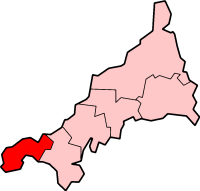
Penwith is an area of Cornwall, England, located on the peninsula of the same name. It is also the name of a former local government district, whose council was based in Penzance. The area is named after one of the ancient administrative hundreds of Cornwall which derives from two Cornish words, penn meaning 'headland' and wydh meaning 'at the end'.

Mousehole is a village and fishing port in Cornwall, England, UK. It is approximately 2.5 miles (4 km) south of Penzance on the shore of Mount's Bay. The village is in the civil parish of Penzance. An islet called St Clement's Isle lies about 350 metres (380 yd) offshore from the harbour entrance.

Madron is a civil parish and village in west Cornwall, England, United Kingdom. Madron is named after Saint Madern's Church. Its annual Trafalgar Service commemorating the death of Vice Admiral Horatio Nelson was started on 27 October 1946, following a local tradition that his death was first announced on British soil in the Union Hotel, Penzance.

The Morrab Library is a subscription library in Penzance, Cornwall in England.
The Manor of Alverton was a former manorial estate located in the hundred of Penwith, west Cornwall, England, United Kingdom.
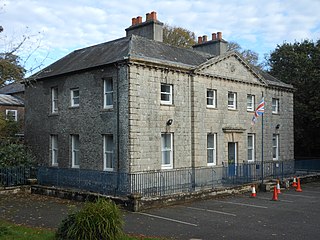
Castle Horneck is a Grade II* listed building, and refurbished Georgian mansion to the west of the Cornish town of Penzance. It is currently owned by the Youth Hostels Association (YHA) and has been used as a youth hostel since 1950.

The Guildhall is a building on Alfred Gelder Street in the City of Kingston upon Hull, East Riding of Yorkshire, England. The building is currently the headquarters of Hull City Council but is also used as a venue for conferences, civic receptions and formal dinners. It is a Grade II* listed building status.

Penlee House is a museum and art gallery in the town of Penzance, Cornwall, home to many paintings by members of the Newlyn School, including The Rain It Raineth Every Day by Norman Garstin, School is Out by Elizabeth Forbes, Among the Missing by Walter Langley and On Paul Hill by Stanhope Forbes. It is operated by Penzance Town Council in association with Cornwall Council.
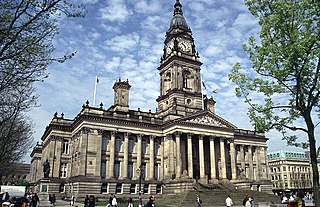
Bolton Town Hall in Victoria Square, Bolton, Greater Manchester, England, was built between 1866 and 1873 for the County Borough of Bolton to designs by William Hill of Leeds and George Woodhouse of Bolton. The town hall was extended in the 1930s to the designs of Bradshaw, Gass and Hope and has been designated a Grade II* listed building by English Heritage.
Alexander Daniell was the sole proprietor of the Manor of Alverton, Cornwall from 1630 until his death in 1668.
Penzance is a town, civil parish and port in Cornwall, United Kingdom. As well as the town of Penzance, the civil parish also includes the town and port of Newlyn and the villages of Gulval, Heamoor, Mousehole and Paul.

St John's Hall, formerly known as the Public Buildings, Penzance, is a municipal building in Alverton Street, Penzance, Cornwall, England. The structure, which was the headquarters of Penzance Borough Council, is a Grade II listed building.
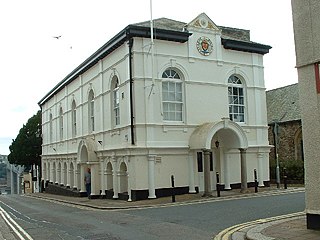
Saltash Guildhall is a municipal building in Fore Street, Saltash, Cornwall, England. The structure, which was the meeting place of Saltash Borough Council, is a Grade II listed building.

Helston Guildhall, formerly Helston Town Hall, is a municipal building on Market Place, Helston, Cornwall, England. The structure, which is the meeting place of Helston Town Council, is a Grade II* listed building.

Liskeard Guildhall is a municipal building in Pike Street, Liskeard, Cornwall, England. The structure, which was the meeting place of Liskeard Borough Council, is a Grade II* listed building.

St Ives Guildhall is a municipal structure in Street An Pol, St Ives, Cornwall, England. The structure, which is the meeting place of St Ives Town Council, is a locally listed heritage asset.
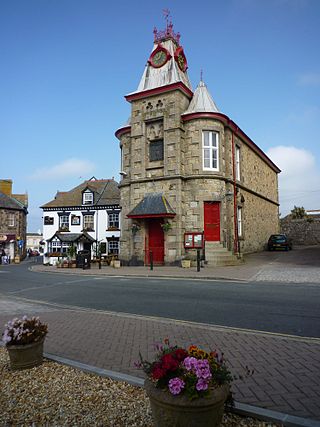
Marazion Town Hall is a municipal building in the Market Place, Marazion, Cornwall, England. The town hall, which currently includes a museum on the ground floor, is a Grade II listed building.


